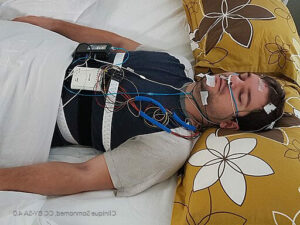
TRIPLE YOUR IMPACT during Triple Giving November | All Donations to OMFCA are TRIPLED through December 2

TRIPLE YOUR IMPACT during Triple Giving November | All Donations to OMFCA are TRIPLED through December 2
This project will investigate sleep disturbance in ME/CFS and Long COVID through a retrospective evaluation of PSG data and a prospective sleep study.
Problems with sleep in ME/CFS is essential to understand and effectively treat or prevent crashes. Previous studies, using technologies available at the time, have failed to identify any specific sleep abnormalities in ME/CFS. Over the past decade, improved technologies and understanding of sleep physiology has become available. Furthermore, more specific treatments and approaches have become available for usage in sleep disorders. We propose to use these current state-of-the-art technologies and understandings to reevaluate sleep studies that have been conducted in the past two years and performed at the MGH Neurology Sleep Medicine Laboratory in well characterized patients with ME/CFS.
Furthermore, in previously collected brain fluid samples, we will develop techniques to measure orexin, which is an important protein that control sleep boundary states.
Lastly, we will conduct a prospective study in ME/CFS and Long COVID with our sleep colleagues at the Beth Israel Deaconess Medical Center Clinical Research Center using the most advanced technologies available to better identify and understand any possible abnormalities in high frequency signals in the deep brain function, in addition to immune function and other components of sleep disturbance.
